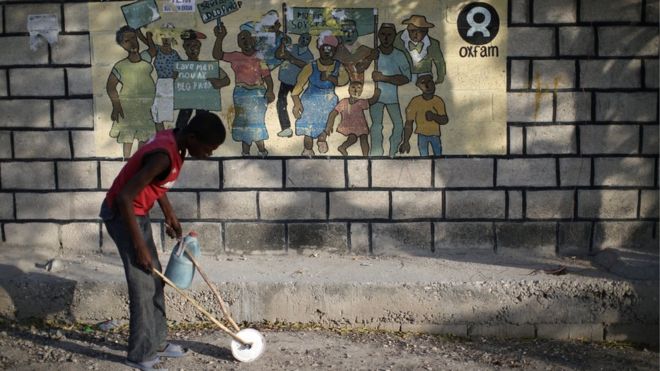The current Oxfam scandal, and the varying array of comments and criticism surrounding it demonstrates in black and white that colonial mentalities still exist towards the developing world. With this in mind, appropriate conduct in crisis zones needs some careful scrutiny. Quite clearly, something is wrong, and the rigour surrounding such behaviour needs to be increased. In light of the recent scandal surrounding Oxfam staff, The Gryphon discusses the people and institutions perpetuating oppressive colonial mentalities towards developing countries.
Since their exposure in an article from The Times on February 9th, allegations have continued to arise concerning the gross sexual misconduct evident within the Oxfam organisation’s efforts to provide aid to developing countries. It is with twisted irony that the allegations being made go against everything the charity stands for. But, the worst part? It seems some are determined to point the finger anywhere but at those who are to blame. Victims in Haiti are being perversely described as “child prostitutes”, neglecting the fact that anyone who has sex with children below the legal age of consent is, by law, a rapist. And, as is painfully almost too predictable, the blame game has led to some looking not at the authority figures, but the situational factors.
The furore over this scandal has only been exacerbated in recent weeks by comments like those from University of Cambridge Professor Mary Beard. On February 16th, Beard tweeted: “Of course one can’t condone the (alleged) behaviour of Oxfam staff in Haiti and elsewhere. But I do wonder how hard it must be to sustain ‘civilised’ values in a disaster zone. And overall I still respect those who go in to help out, where most of us [would] not tread.”
Here we have a Cambridge University professor, someone of intellectual esteem and influence, taking a dangerously ‘lesser of two evils’ approach. Bordering on the absurd, Beard’s public stance appears to suggest that those who volunteer in disaster zones, but behave obscenely, should be praised regardless of their actions, above those who do not offer their help at all. Beard champions the overriding ‘good intentions’ that mask the horrifying reality. Yes, disaster zones are arguably the most challenging environments to live and work in, but if we are using this to justify a total moral U-turn, then the prospects of recovery for these developing countries are bleak at best.
In order to make further sense of these events, we may need to look at colonial legacies, and neo-colonialism. As the former President of Ghana, Kwame Nkrumah, stated in 1965: “The result of neo-colonialism is that foreign capital is used for the exploitation rather than the development of the less developed parts of the world.” The Oxfam scandal is underpinned by this mentality, but perhaps now the full extent of the twisted manipulation of positions of authority and sheer disregard of human rights is just beginning to be unveiled to the Western world.
“In times of intense need, such as natural disasters, this imbalanced dynamic is being exploited as the ‘saviour’ nation gracing the developing country on a refashioned civilising mission”
We can trace examples of such behaviour, as well as racist beliefs feeding victimisation, from the colonial era. During the early 18th Century, anti-miscegenation laws were enacted, prohibiting interbreeding between natives and colonisers. A period of ‘black peril’ surfaced, which propagated imagined beliefs of racial threat and sexual assault by native men on European women. This led to the widespread execution of innocent men, when in reality ‘white peril’ was far more common, with European men preying on native females. It was perhaps during this time that the seed was sown, as sexual control ultimately meant social control.
Today, the context is evidently very different. These maintained dependencies, from the point of the previously colonised nation, and the residual attitude of superiority from the European powers is what makes scandals like these possible. In times of intense need, such as natural disasters, this imbalanced dynamic is being exploited as the ‘saviour’ nation gracing the developing country on a refashioned civilising mission. The moral boundary is still clearly very blurred, and there remains a deeply ingrained notion of “them” and “us”. Though these actions may be partly or indirectly caused by residual imperialist beliefs, they are certainly not excused by them.
So how can we begin to move forward from this? When talking about what is considered acceptable behaviour in crisis zones, it’s really not that complicated. We are all human and are entitled to basic human rights. No one should be taken advantage of. Charities must set an example and maintain a zero-tolerance policy on exploitation. Though undoubtedly easier said than done, we need to work to change attitudes towards developing countries and dispel the mantra of ‘them vs us’.
These people in crisis zones are in desperate situations of need, and they deserve nothing less than the utmost respect. We must not allow this to be jeopardised as a result of an authority complex, borne out of an outdated, imperialist mindset.
Caitlin Tilley
[Image: BBC]

